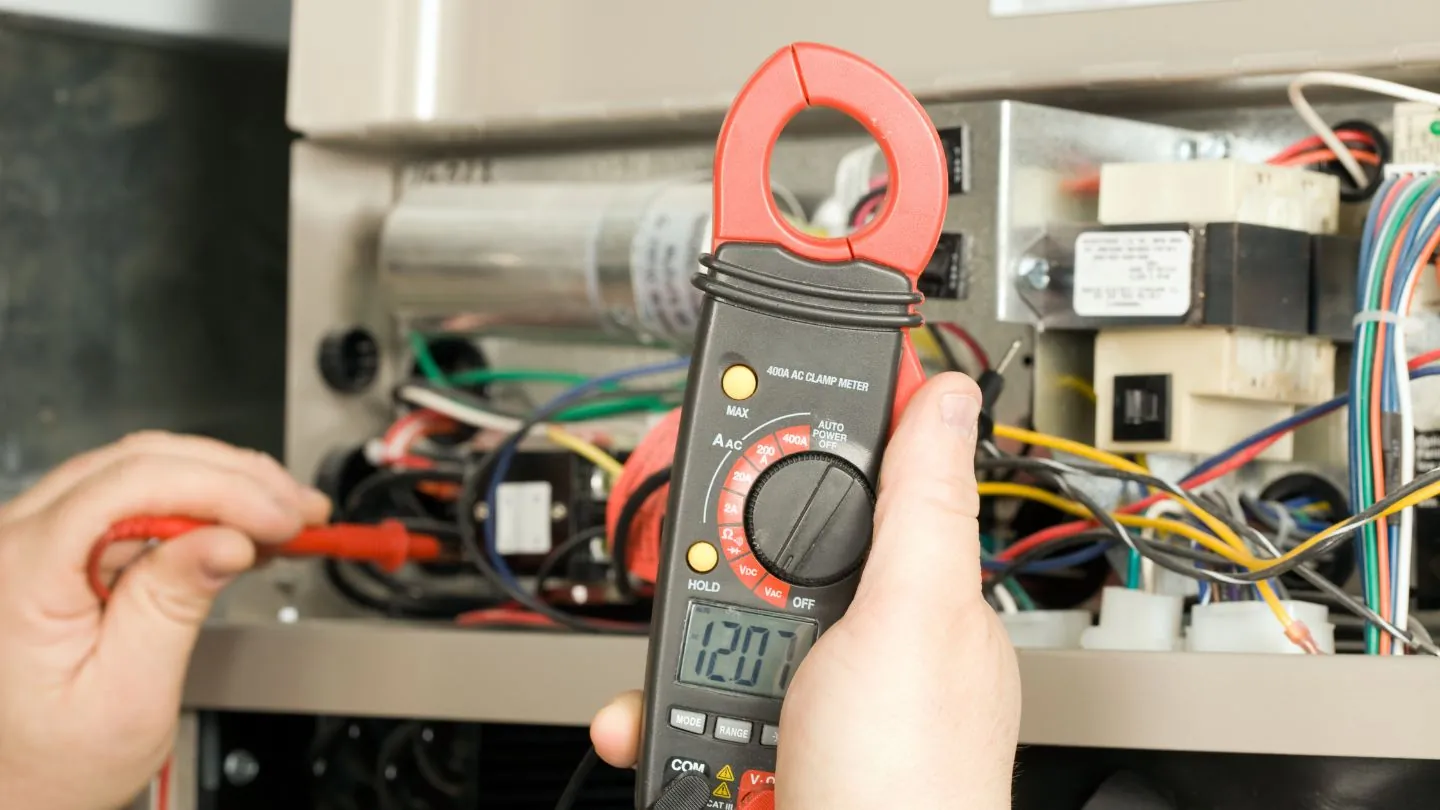Top Reasons Why Air Conditioner Compressor Not Working & How to Fix It
Is your air conditioner compressor not working? Don’t worry. This blog will explain the most common reasons why an air conditioner compressor is not working and how to fix them so you can get your AC running again.
Key Takeaways
- Power supply issues, such as tripped circuit breakers or blown fuses, are common reasons why AC compressors fail to work.
- Electrical problems, including faulty wiring and bad relays, can disrupt power delivery to the compressor and cause operational failures.
- Regular maintenance is crucial for preventing compressor issues; it helps identify minor problems early and extends the lifespan of the unit.
Power Supply Issues
When the AC compressor fails to operate, it often stems from an inadequate power supply. Should your air conditioner cease functioning unexpectedly, a licensed HVAC technician will first check if it has an active power connection. Indicators of electrical issues may include a dormant compressor, no operational sound, or warm air from vents—signs often related to a tripped circuit breaker or a blown fuse interrupting the power flow.
Resolving problems tied to the power supply is typically straightforward for trained professionals, but it’s essential for system restoration. No AC system component can function without electricity. HVAC specialists will carefully inspect common culprits like compromised circuit breakers or fuses and ensure a safe and stable electrical connection is restored.
Tripped Circuit Breaker
If the circuit breaker has tripped, it can disrupt the AC compressor’s power. HVAC technicians address this by inspecting the main electrical panel and restoring the breaker to the ‘On’ position if appropriate. However, if the breaker continues to trip, this signals an underlying issue requiring further investigation.
Loose wiring connections to the motor or grounding faults can trigger repeated shutdowns. Professionals will perform a detailed inspection to ensure all wiring is secure and meets safety standards, which helps prevent recurring operational interruptions.
Blown Fuse
Blown fuses are another frequent cause of compressor failure. Trained technicians identify a blown fuse by inspecting it for visible breaks or burn marks. They will replace it using a fuse with matching specifications to ensure safety and compatibility.
HVAC experts also investigate why the fuse blew in the first place, identifying potential overloads, shorts, or electrical surges that may have stressed the system.
Electrical Problems

Electrical failures can significantly impair the AC compressor’s performance. If the breaker keeps tripping, this may indicate a deeper electrical issue, often linked to damaged components such as wires or contactors.
Professionals also look for corrosion, wear, or overheating at connection points—factors that reduce voltage consistency. Electrical surges may damage capacitors, and loose or frayed wiring can disrupt thermostat-to-system communication. These challenges demand trained HVAC specialists to diagnose and correct the problem using specialized tools and diagnostic techniques.
Faulty Wiring
Defective wiring can result in grounding faults, obstructing power delivery to the compressor. Diagnosing and correcting wiring problems is a complex task best handled by HVAC professionals. They use multimeters, voltage testers, and detailed wiring diagrams to identify inconsistencies or faults in the circuit.
Certified technicians ensure all wiring is code-compliant, preventing future breakdowns and improving system reliability.
Bad Relay or Contactor
Relays and contactors control the electrical flow to the compressor. If either fails, it can interrupt operation. Signs of this issue include a non-starting compressor, humming sounds, or intermittent cooling cycles.
HVAC professionals turn off the system, safely remove the faulty component, and replace it with a matching part. They also perform continuity tests to confirm full functionality before restoring power.
Refrigerant Issues
Refrigerant plays a key role in the cooling cycle, and compressor problems often arise when there are refrigerant imbalances. When refrigerant is too low or leaking, the system cannot effectively absorb and release heat, leading to underperformance.
HVAC specialists check refrigerant levels using pressure gauges and identify leaks with electronic leak detectors or UV dye testing. When issues are found, they repair leaks, recharge the refrigerant to manufacturer specifications, and verify system performance post-repair.
Low Refrigerant Levels
When refrigerant levels drop, it may trigger the high- or low-pressure switches, which cut power to the compressor to prevent damage. This condition compromises the AC’s ability to cool your home effectively.
Professionals examine compressor valves and look for signs of internal leakage. Any damaged valves or mechanical wear are addressed through repairs or, in some cases, compressor replacement, ensuring system pressure returns to optimal levels.
Refrigerant Leak
Refrigerant leaks often result in diminished cooling, unusual sounds, or frost on coils. A hissing noise or visible ice on components signals a problem.
Trained HVAC professionals isolate the leak source, seal it using appropriate methods, and recharge the system with the correct refrigerant type and volume. Timely repair prevents compressor strain and preserves long-term efficiency.
Component Failures

Compressor malfunctions are often the result of internal component failures. As these parts age, wear and operational stress can reduce efficiency.
HVAC professionals monitor system pressures and evaluate the entire refrigerant loop. If obstructions or overheating are detected, they address airflow issues, replace worn-out motors or capacitors, and restore smooth operation.
Faulty Capacitor
The capacitor helps the compressor start and maintain operation. If it becomes damaged due to power surges or component failure, it can prevent the compressor from running.
Technicians test capacitor health using multimeters and check microfarad readings. If faulty, they’ll install a replacement part rated precisely for your unit’s model to ensure optimal performance.
Compressor Motor Failure
Signs of motor failure include leaking refrigerant, difficulty starting, or warm air blowing instead of cool. A locked or burnt-out motor needs prompt attention.
HVAC professionals will evaluate whether the compressor can be repaired or if a full replacement is required. Excessive wear or internal damage may necessitate installing a new compressor to prevent cascading system issues.
Airflow Issues
Restricted airflow from dust, dirt, or debris can affect compressor performance. If airflow is limited, the compressor may overheat, leading to mechanical strain and eventual failure.
HVAC professionals assess airflow using airflow meters and inspect the entire duct system and components like filters and coils. They clean or replace parts as needed to restore full airflow and maintain efficient operation.
Dirty Air Filter
A clogged air filter restricts airflow, which may cause the evaporator coil to freeze and strain the compressor.
Technicians recommend filter replacement schedules based on usage and environmental factors. They inspect filters during maintenance and ensure optimal airflow is restored by installing new filters when necessary.
Read more: Air Conditioner Maintenance Timing and Frequency
Dirty Condenser Coil
A dirty coil obstructs heat dissipation, increases refrigerant pressure, and overworks the compressor. If ignored, this could cause electrical trips or damage.
HVAC professionals use coil cleaning agents or pressure washing to remove buildup and restore optimal heat transfer. This routine task ensures pressure stability and system reliability.
Thermostat and Sensor Problems
A thermostat miscommunication or sensor malfunction can prevent the compressor from turning on. If readings are inaccurate or placement is off, the system might behave unpredictably.
Professionals test sensor alignment and thermostat calibration using industry tools. Any faulty components are replaced, and settings are fine-tuned to match the environment and system requirements.
Faulty Thermostat
If the thermostat isn’t communicating with the system, the compressor may not run. HVAC technicians will inspect battery function, wiring, and configuration.
If necessary, they’ll recalibrate or replace the thermostat, ensuring it properly controls the HVAC system based on user inputs and room temperature.
Malfunctioning Sensors
Misaligned or contaminated sensors may misread temperatures, leading to system shutdowns or erratic compressor operation.
Certified technicians clean, reposition, or replace sensors as needed. They also recalibrate sensors to ensure accurate readings that enable the system to function correctly.
Age and Wear
Compressors typically last 10 to 15 years and require routine maintenance. As they age, internal lubrication may diminish, leading to overheating and premature failure.
HVAC professionals check for oil quality and motor condition during inspections. Timely servicing helps avoid wear-related breakdowns and allows for proactive repairs or replacements.
Old Age
Older compressors suffer from reduced efficiency and higher failure risks. Wear from prolonged use can lead to declining cooling performance and reliability.
Technicians assess whether an aging compressor is still viable or if replacement will offer better efficiency and lower operational costs.
Read more: Clear Signs It’s Time for a New Air Conditioner
Regular Maintenance
Regular maintenance is essential for preventing major failures. HVAC professionals perform routine checks, clean internal components, and replace filters or capacitors as needed.
Addressing issues early enhances system efficiency, extends lifespan, and minimizes the risk of emergency repairs, keeping your system running smoothly year-round.
Professional Diagnosis and Repair
If you’re unable to determine why your AC compressor isn’t working, contacting a professional HVAC technician is crucial. They have the tools and expertise to diagnose the problem accurately and recommend repair or replacement options tailored to your system.
Our certified HVAC technicians in Port Charlotte, handles a wide range of system types and can replace failed components such as relays, contactors, or compressors. In severe cases, they may recommend a complete system upgrade for improved performance and energy savings.
Summary
In conclusion, understanding the root causes of AC compressor issues and addressing them with professional HVAC diagnosis is essential to prevent more significant problems. Regular maintenance and prompt repairs are key to ensuring your air conditioning system remains efficient and dependable.
For top-tier air conditioner repair in North Port, Total Comfort Cooling & Heating Inc. offers tailored maintenance solutions to keep your system performing at its best. We provide comprehensive repair, installation, and preventive care services to guarantee your comfort in Port Charlotte, Rotonda, Punta Gorda, Burnt Store, and the surrounding areas. Contact us today to discover how we can enhance your cooling experience!
Frequently Asked Questions
Can a failing AC compressor affect my energy bills?
Yes, a failing compressor works harder to maintain cooling, which can lead to higher energy consumption and increased utility costs.
Is it better to replace the compressor or the entire AC unit?
It depends on the system’s age and overall condition. If the unit is older or has other issues, replacing the entire system may be more cost-effective in the long term.
How long does it take a professional to diagnose a compressor issue?
In most cases, an experienced technician can diagnose compressor-related problems within one to two hours, depending on system complexity.
READY FOR YOUR NEXT HEATING OR COOLING PROJECT?
Contact us to get a quote and see why our customer service is recognized as the best in the industry.







 Special Offer: 12 Months - No Interest, No Payments!
Special Offer: 12 Months - No Interest, No Payments!